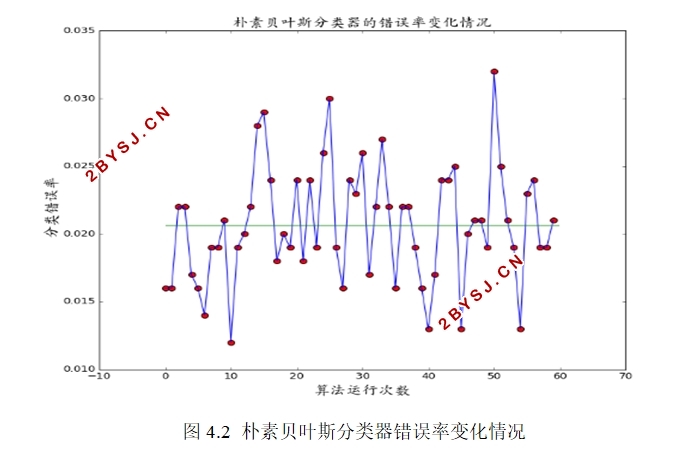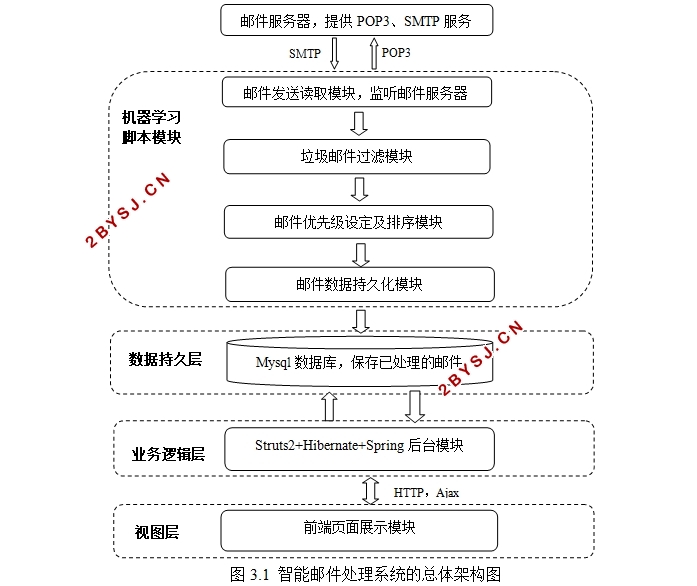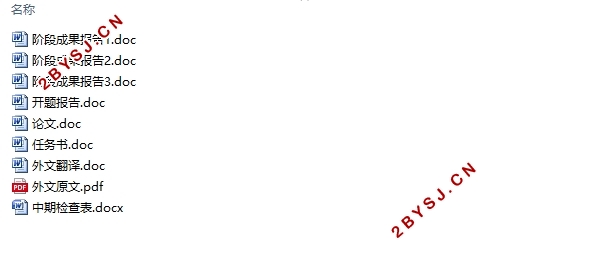基于机器学习的智能邮件分析处理系统的设计
无需注册登录,支付后按照提示操作即可获取该资料.
基于机器学习的智能邮件分析处理系统的设计(任务书,开题报告,中期检查报告,外文翻译,阶段性报告,论文14600字)
摘 要
电子邮件作为现代互联网应用广泛的服务,具有价格低廉、操作简便和即时通讯等优势,已经逐渐成为工作生活不可或缺的网络通信方式。但目前的邮件系统还存在一些问题,比如:用户每天可能会收到数封邮件,收件箱逐渐臃肿,邮件并没有按照一定规则进行归类排序,不方便用户对邮件的管理,而且可能因此会错过相对重要的邮件。互联网上充斥着大量的垃圾邮件,给用户带来了一定程度上的危害。虽然目前基于白名单+黑名单的模式过滤垃圾邮件效果不错,但用户操作不简便,垃圾邮件过滤不具普遍性。
基于上述原因,研究邮件按照一定优先级排序和提高垃圾邮件过滤效果与便捷性等智能化处理具有重要意义。作者的主要研究工作如下:
1、研究实现了朴素贝叶斯垃圾邮件过滤算法。算法通过大量的样本进行训练得到最佳模型参数,测试阶段,算法分类的平均错误率约为2.06%;
2、研究实现了一种改进垃圾邮件过滤的算法。在朴素贝叶斯算法的基础上,结合AdaBoost自适应增强算法,优化模型参数,提高邮件过滤性能,测试阶段,算法分类的平均错误率约为0.6%,性能提高约70%;
3、研究实现了一种邮件优先级设定算法。能够根据邮件的主题、正文和附件等内容设定一定的优先级,并将邮件按照优先级排序;
4、实现了完整邮件智能处理平台。搭建JAVA后台服务器,辅助机器学习算法脚本,实现了邮件发送、接收、垃圾邮件过滤和优先级排序等智能化处理功能。
通过对智能邮件处理系统的测试,在较长时间内对不同邮件的分析实验,发现该系统对垃圾邮件过滤和邮件优先级设定的平均错误率低于5%,这说明本智能邮件处理系统具有高垃圾邮件过滤精度,有效设定邮件优先级,无需用户复杂的设定,便于操作。
关键词:机器学习;垃圾邮件过滤;邮件优先级;邮件智能处理平台
Abstract
E-mail as a modern Internet service, is applied widely with low cost, easy operation and the advantages of the instant interactive, has gradually become an essential part of network communication. However, there are still some problems in the current mail systems, such as: user may receives many e-mails and email inbox gradually bloated, however messages are not classified and sorted according to certain rules, it is not convenient for users to manage e-mails, and may, therefore, will miss some important messages. Another problem is the proliferation of spam, which brings great inconvenience to users. Although the current spam filter model based on the white-list and black-list is good, but the user is not easy to operate, spam filtering is not universal.The paper's main research work is as follows:
1.Researched and implemented a naive Bayesian spam filtering algorithm, the algorithm trained by a large number of samples to optimize the model parameters. In the testing phase, the average error rate of the algorithm is about 2.06%;
2.Researched and implemented an improved spam filtering algorithm, based on the naive Bayesian algorithm, using AdaBoost adaptive enhancement algorithm to optimize the parameters of the model, and improve the performance of the mail filtering. In the testing phase, the average error rate of classification is about 0.6% and improve the performance about 70%;
3.Researched and implemented a mail priority setting algorithm, Using the subject, content, attachments and other content to set a certain priority and rank the email by priorities;
4.Implemented the complete intelligent mail processing platform and build a JAVA server with machine learning algorithm script, realized the intelligent mail sending, receiving, spam filtering and prioritization and processing functions.
Through the test of intelligent mail processing system, in the long time of different mail analysis experiment, we found that the average error rate of spam filtering and e-mail priority setting is less than 5%, indicating that the intelligent e-mail processing system has high spam filtering accuracy, set the priority mail effectively, and without the complex setting, easy to operate.
Keywords: machine learning; Spam filtering; Email priority ; Mail intelligent processing platform;



目 录
第1章 绪论 1
1.1 课题研究的背景及意义 1
1.2 国内外的研究现状分析 1
1.3 论文组织结构 3
第2章 智能邮件处理的基本理论和关键技术 4
2.1 电子邮件系统的工作原理 4
2.1.1 电子邮件系统的基本构成 4
2.1.2 电子邮件系统常用的网络协议 5
2.1.3 电子邮件系统的传送机制 5
2.2 机器学习的基本原理 6
2.3 贝叶斯理论基本内容 7
2.4 J2EE后台相关技术 7
2.4.1 MVC模式简介 8
2.4.2 SSH框架简介 8
2.5 本章小结 9
第3章 智能邮件处理系统的设计与实现 10
3.1 系统总体架构 10
3.2 邮件获取与解析模块 11
3.2.1 电子邮件读取协议详解 11
3.2.2 解析邮件内容 12
3.3 垃圾邮件过滤及邮件优先级设定模块 13
3.3.1 文档词袋模型 13
3.3.2 语料库获取及数据预处理 14
3.3.3 朴素贝叶斯垃圾邮件过滤算法的设计与实现 15
3.3.4 朴素贝叶斯过滤器结合AdaBoost算法的设计与实现 17
3.3.5 邮件优先级设定算法 18
3.4 后台服务器模块 19
3.5 本章小结 20
第4章 智能邮件处理系统的运行及结果分析 21
4.1 邮件获取与解析模块 21
4.1.1 运行效果 21
4.1.2 结果分析 21
4.2 朴素贝叶斯垃圾邮件过滤模块 21
4.2.1 运行效果 21
4.2.2 结果分析 22
4.3 基于扩展朴素贝叶斯算法的邮件优先级设定 22
4.3.1 运行效果 23
4.3.2结果分析 23
4.4 利用AdaBoost算法提高过滤性能 23
4.4.1 运行效果 24
4.4.2 结果分析 24
4.5 JAVA后台及前端展示 24
4.5.1 运行效果 24
4.5.2 结果分析 26
4.6 本章小结 26
第5章 总结与展望 27
5.1 论文总结 27
5.2 工作展望 27
参考文献 29
致 谢 30
